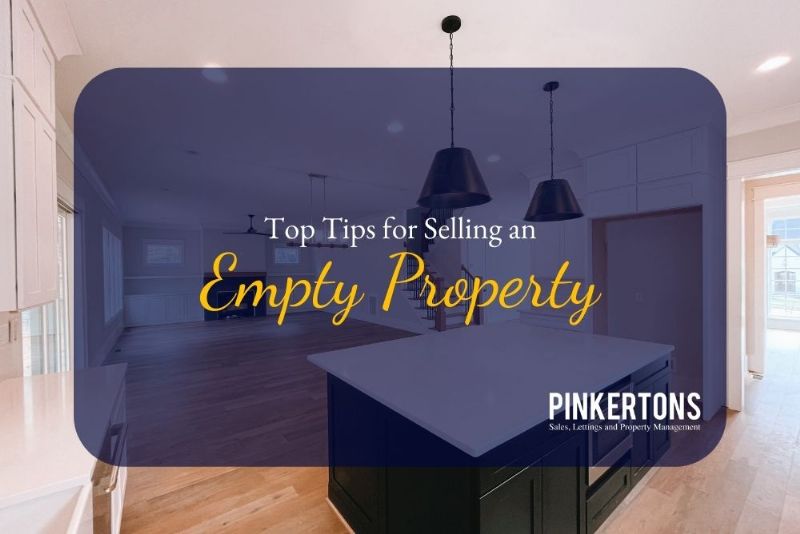
Most estate agents will tell you that to secure a good property sale, it’s best to market a home fully furnished. But to quote the Rolling Stones, ‘You can’t always get what you want’.
Whether it be due to a death in the family or a sudden change in circumstances, sellers sometimes find themselves with an empty property to market.
When this happens, what’s the best strategy?
Let’s think about visuals
Empty homes tend to ‘stick’ because we humans are visual creatures. We find it easier to imagine ourselves living in a property that looks ‘lived in’. Photographs of empty rooms don’t ‘tell a story’.
Buyers also struggle to judge the size of a room without everyday items, such as beds or sofas, to provide visual perspective.
Bearing this in mind, if you’re selling an empty property, here’s what you should do.
Create a blank canvas
Invest time into presenting the property as a blank canvas onto which a buyer can quickly stamp their own personal touch.
Remove junk from inside and outside and give everything a good clean. (Empty doesn’t have to mean grotty.)
Patch up the walls and paint them in a neutral colour.
Clean the carpets or, if they’re beyond saving, pull them up and tidy up the floorboards.
Cut back any overgrown bushes in the garden.
To stage or not to stage
Once you’ve got the bare bones of your home shipshape, consider whether to ‘stage’ the property.
You could go big and rent furniture and furnishings from a professional staging company. While this will require a financial outlay, if your property is in a high-value area, it’s a move that could make you money in the long run.
If this isn’t a realistic option, you could still bring in some furniture – borrowed or nabbed from your own home – to help buyers understand the layout. Think beds in the bedrooms, a table and chairs in the kitchen, and a sofa in the living room. It’s a kind of ‘staging lite’ approach that can give a property an extra push.
A final word about security
Whatever you decide to do, prioritise security ¬– thieves and squatters target empty homes. Check the locks and make regular visits to the property to remove any tell-tale signs that it’s empty. Install lamps that operate on a timer, so that the lights go on at night.
For more advice on marketing your property, contact us here at Pinkertons.
Whether it be due to a death in the family or a sudden change in circumstances, sellers sometimes find themselves with an empty property to market.
When this happens, what’s the best strategy?
Let’s think about visuals
Empty homes tend to ‘stick’ because we humans are visual creatures. We find it easier to imagine ourselves living in a property that looks ‘lived in’. Photographs of empty rooms don’t ‘tell a story’.
Buyers also struggle to judge the size of a room without everyday items, such as beds or sofas, to provide visual perspective.
Bearing this in mind, if you’re selling an empty property, here’s what you should do.
Create a blank canvas
Invest time into presenting the property as a blank canvas onto which a buyer can quickly stamp their own personal touch.
Remove junk from inside and outside and give everything a good clean. (Empty doesn’t have to mean grotty.)
Patch up the walls and paint them in a neutral colour.
Clean the carpets or, if they’re beyond saving, pull them up and tidy up the floorboards.
Cut back any overgrown bushes in the garden.
To stage or not to stage
Once you’ve got the bare bones of your home shipshape, consider whether to ‘stage’ the property.
You could go big and rent furniture and furnishings from a professional staging company. While this will require a financial outlay, if your property is in a high-value area, it’s a move that could make you money in the long run.
If this isn’t a realistic option, you could still bring in some furniture – borrowed or nabbed from your own home – to help buyers understand the layout. Think beds in the bedrooms, a table and chairs in the kitchen, and a sofa in the living room. It’s a kind of ‘staging lite’ approach that can give a property an extra push.
A final word about security
Whatever you decide to do, prioritise security ¬– thieves and squatters target empty homes. Check the locks and make regular visits to the property to remove any tell-tale signs that it’s empty. Install lamps that operate on a timer, so that the lights go on at night.
For more advice on marketing your property, contact us here at Pinkertons.


